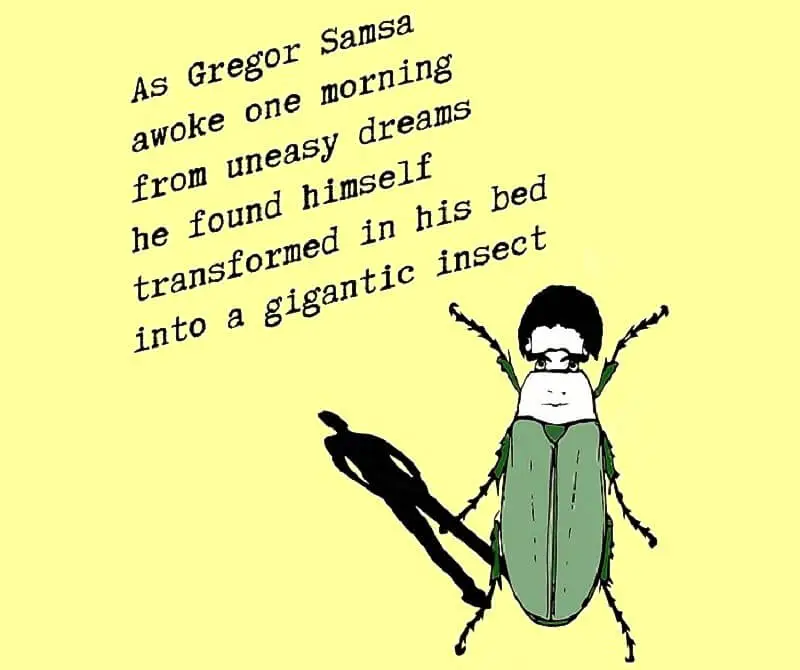Franz Kafka’s “The Metamorphosis” is a cornerstone of existential literature, delving into themes of isolation, alienation, and the search for identity. In this article, we will explore the intricacies of Kafka’s masterpiece, analyzing its plot, themes, symbolism, psychological underpinnings, and enduring legacy.
| Name of PDF Original Title | The Metamorphosis Die Verwandlung |
|---|---|
| No Pages | 27 |
| Author | Franz Kafka |
| Originally Published | 1915 |
| Language | German |
| Genres | Novella, Allegory, Absurdist fiction, Fantasy Fiction, Psychological Fiction, Adventure fiction |
| Size | 1.51 MB |
| Chek, latest edition |
more novel We Hunt the Flame PDF
Table of Contents

Author and Background
Franz Kafka, a German-speaking Bohemian writer, penned “The Metamorphosis” in 1915. Born in Prague in 1883, Kafka’s works often explored themes of bureaucracy, existentialism, and the absurdity of life. Despite being one of his shorter works, “The Metamorphosis” remains one of his most famous and studied pieces.
Plot Summary
“The Metamorphosis” follows the protagonist, Gregor Samsa, who wakes up one morning to find himself transformed into a giant insect. The novella explores Gregor’s struggle to come to terms with his new form and the subsequent reactions of his family.
Gregor Samsa’s Transformation
Gregor’s sudden metamorphosis into a bug serves as the central plot device. As he grapples with his new body, his sense of self and identity undergo a profound shift.
Family Dynamics
The novella also delves into the dynamics within the Samsa family, particularly the strained relationships between Gregor and his parents and sister.
Gregor’s Isolation
Gregor’s transformation leads to his isolation from society, as he becomes increasingly alienated from both his family and the outside world.
Themes Explored
Alienation
One of the central themes of “The Metamorphosis” is the experience of alienation. Gregor’s transformation serves as a metaphor for the alienation and estrangement that many individuals feel in modern society.
Identity
The novella also explores questions of identity, as Gregor grapples with his new insect form and struggles to maintain a sense of self.
Duty and Responsibility
“The Metamorphosis” examines the theme of duty and responsibility, particularly in relation to Gregor’s role as the primary breadwinner for his family.

Symbolism in “The Metamorphosis”
Gregor’s Bug Form
Gregor’s insect form is rich in symbolism, representing his feelings of worthlessness and insignificance in the eyes of his family and society.
The Samsa Family Home
The Samsa family home symbolizes the confinement and suffocation that Gregor experiences, trapped both physically and emotionally within its walls.
Psychological Analysis
Gregor’s Mental State
The novella provides insights into Gregor’s deteriorating mental state as he grapples with his transformation and its consequences.
Impact on Other Characters
“The Metamorphosis” also explores the psychological impact of Gregor’s transformation on his family members, particularly his sister Grete.
Reception and Legacy
Despite its initial lukewarm reception, “The Metamorphosis” has since gained widespread acclaim and is considered one of Kafka’s finest works. Its themes and symbolism continue to resonate with readers across generations.
Comparison with Other Works
“The Metamorphosis” is often compared to other works of existential literature, such as Albert Camus’s “The Stranger” and Jean-Paul Sartre’s “Nausea,” due to its exploration of similar themes and motifs.
Conclusion by The Metamorphosis PDF
In conclusion, “The Metamorphosis” remains a timeless masterpiece that continues to captivate readers with its exploration of existential themes and its haunting portrayal of alienation and identity. Kafka’s vivid imagery and profound insights into the human condition ensure that the novella retains its relevance and power to provoke thought and discussion.

FAQs about The Metamorphosis PDF
What inspired Kafka to write “The Metamorphosis”?
Kafka’s own feelings of alienation and estrangement from society are believed to have influenced his writing of “The Metamorphosis.” Additionally, his fraught relationship with his domineering father may have contributed to the themes of familial conflict explored in the novella.
What is the significance of the title “The Metamorphosis”?
The title “The Metamorphosis” refers not only to Gregor’s physical transformation into a bug but also to the profound psychological and emotional changes he undergoes throughout the novella.
Why did Gregor transform into a bug?
The exact reason for Gregor’s transformation is left ambiguous in the novella. However, it is widely interpreted as a metaphor for his feelings of worthlessness and alienation, as well as the dehumanizing effects of modern society.
How does “The Metamorphosis” reflect existentialist themes?
“The Metamorphosis” explores existentialist themes such as the absurdity of human existence, the search for meaning in a seemingly indifferent universe, and the experience of alienation and isolation.
What is the legacy of “The Metamorphosis”?
“The Metamorphosis” has left a lasting legacy in literature and popular culture, inspiring numerous adaptations, interpretations, and scholarly analyses. Its themes and imagery continue to resonate with readers worldwide.
Is The Metamorphosis a horror book?
unexplained horror
Why did Gregor turn into a bug?
A bug is a systematic creature, looked down upon as insignificant and repulsive
What is the main idea of the Metamorphosis by Franz Kafka?
alienation, the absurdity of life, and the power of change.
What is the story of The Metamorphosis?
a man named Gregor Samsa who becomes an insect





